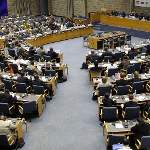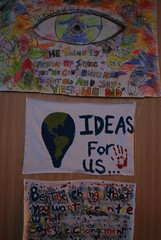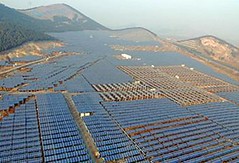 聯合國一個由現任與卸任元首、部長以及國會議員所組成「全球永續發展高階小組」,1月30日提出了一項新報告,為今年6月將在巴西所舉辦的「聯合國永續發展大會」,啟動了一項「常綠」綠色革命,推動全球能停止使用化石燃料;該計畫並與聯合國的扶貧、對抗不公平等議題相連結,利用促進風能、太陽能以及其他可再生性能源,來推動富國與窮國的經濟。
聯合國一個由現任與卸任元首、部長以及國會議員所組成「全球永續發展高階小組」,1月30日提出了一項新報告,為今年6月將在巴西所舉辦的「聯合國永續發展大會」,啟動了一項「常綠」綠色革命,推動全球能停止使用化石燃料;該計畫並與聯合國的扶貧、對抗不公平等議題相連結,利用促進風能、太陽能以及其他可再生性能源,來推動富國與窮國的經濟。
這份名為《韌性的人類與地球:值得選擇的未來》(Resilient People, Resilient Planet: A Future Worth Choosing)的報告,包含56項能能快速實現永續發展的建議,讓永續發展從籠統的概念成為主流經濟學的核心。
報告指出,「各國政府和國際組織應努力創造新的綠色革命,一個屬於21世紀的『常綠的綠色革命』,對農業研究、保護危急的動植物、水土保育以及對抗汙染方面進行更多的投資。」
報告建議設立區域海洋與沿岸管理機構,保護提供1.7億個工作機會、餵飽全球五分之一人口的海洋漁業。
工作小組建議政府應該「在區域、國家與國際層級上,促進年輕人參與並在決策過程中發揮影響力。更進一步的,協商的過程與對話應該鼓勵納入年輕社群與非傳統網絡的聲音,像是網路論壇以及輿論部落格。」
韌性 邁向Rio+20的思考準備
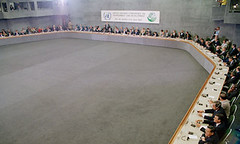 此份報告可說為2012年6月20至22日於巴西舉辦的聯合國永續發展大會(Rio+20),進行會前暖身工作。該大會的主軸有二:綠色經濟背景下的永續發展與消除貧窮,以及永續發展的體制框架。大會最後將會提出一份政治性的文件。
此份報告可說為2012年6月20至22日於巴西舉辦的聯合國永續發展大會(Rio+20),進行會前暖身工作。該大會的主軸有二:綠色經濟背景下的永續發展與消除貧窮,以及永續發展的體制框架。大會最後將會提出一份政治性的文件。
這個大會是20年前、1992年里約地球高峰會歷史性會議之後,每十年一次的會議。1992年當時,有100多位元首參與,啟動了全球環境運動並通過「21世紀議程」(Agenda 21),成為全球永續發展行動的藍圖。也是在該次會議中,全球首度一致接受在聯合國氣候變化框架公約之下,訂定自願性的溫室氣體排放控制協議。
不過聯合國高階小組在這份新的報告中警告,全世界還沒有解決「永續發展的困境」。
小組報告中寫道,「隨著全球人口由70億增加到2040年的接近90億,而中產階級消費者在未來20年間增加30億人的情況下,對資源的需求將會呈指數性的成長。」
糧食、飲水、能源三大問題 需有綜合性的視野
 「2030年時,全世界至少需要比現在多50%的糧食、45%的能源以及30%的水,使環境的負荷量被推到新的界線上。這些都是真實且不只是造成氣候變遷,會在各方面影響人類與地球的健康。」
「2030年時,全世界至少需要比現在多50%的糧食、45%的能源以及30%的水,使環境的負荷量被推到新的界線上。這些都是真實且不只是造成氣候變遷,會在各方面影響人類與地球的健康。」
小組最殷切的建議之一是在「糧食、飲水以及能源議題之間,建立新的關係,而不是分開討論。這三項議題必須要完全整合,如果要處理全球量時危機就不能個別處理。」
小組敦促政府「建立評價永續發展的價值信號,引導家庭、企業以及公部門做消費與投資的決定。」
小組建議政府建立的價值信號包括:
- 在2020年以前,通過稅收、法規或排放權交易等機制,建立自然資源和外部的定價工具,包括碳定價。
- 改革國家財政和信貸系統,提供長期獎勵永續行為,同時懲罰不永續的行為。
- 發展並擴大國家與國際生態系統管理計畫,像是用水、農業、漁業以及林業系統。
- 2020年以前,停止對石化燃料的補貼,並減少其他「不正當或扭曲的補貼」。在所提出的56項建議中,小組贊同潘基文秘書長的「所有人的永續能源」倡議,並認為應即刻實施。
在這份報告中,小組注意到「近年來再生能源在電力、熱能以及運輸方面的大幅成長,估計可再生能源佔了全球總消耗能源的16%。2010年間,新增的電力來源中約有50%屬於可再生能源。」
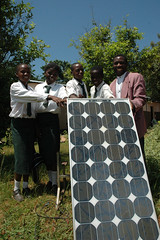 報告指出,「電力部門方面的進展尤其顯著,2010年間可再生能源供應了全球將近20%的電力」,強調「科學」是永續發展議題中做決定的基礎,並呼籲每年定期出版的全球永續發展展望報告,應該由聯合國秘書長擔任召集工作,以整合各部門與機構的知識,並考慮設立科學諮詢委員會或是科學顧問。
報告指出,「電力部門方面的進展尤其顯著,2010年間可再生能源供應了全球將近20%的電力」,強調「科學」是永續發展議題中做決定的基礎,並呼籲每年定期出版的全球永續發展展望報告,應該由聯合國秘書長擔任召集工作,以整合各部門與機構的知識,並考慮設立科學諮詢委員會或是科學顧問。
小組建議,整體來說,各國應全面將商業產生的社會與環境成本,整合至商品與服務的價格與措施之中。
※ 完整報告下載
A panel of current and former heads of government, ministers and lawmakers Monday launched a plan for world leaders to propel an "ever-green" energy revolution that could wean the world off fossil fuels, when they meet in Brazil later this year.
The report of the High-level Panel on Global Sustainability links the United Nations' goals of reducing poverty and inequality to promoting the use of wind, solar and other renewable energy sources to power the economies of rich and poor nations alike.
The report, "Resilient People, Resilient Planet: A Future Worth Choosing," contains 56 recommendations to put sustainable development into practice quickly, moving it from a general concept to the core of mainstream economics.
The report says governments and international organizations "should work to create a new green revolution, an 'ever-green revolution' for the 21st century" by spending more on agricultural research, protecting imperiled plant and animal species, conserving land and water and fighting pollution.
It urges creation of regional oceans and coastal management bodies that protect world fisheries, which supply 170 million jobs and daily protein for about one in five people on the planet.
The panel advises governments to "enable young people's participation in and influence on decision-making processes at the local, national and international levels. In addition, consultation processes and dialogue should be encouraged to incorporate voices from non-conventional networks and youth communities, such as Internet forums and opinion-making blogs."
The report of the High-level Panel contributes to preparations for the UN Conference on Sustainable Development (Rio+20) in Brazil June 20-22, 2012.
Rio+20 will focus on two themes - a green economy in the context of sustainable development and poverty eradication; and the institutional framework for sustainable development. It will result in a focused political document.
This conference comes 20 years after the landmark Earth Summit in Rio in 1992 that attracted more than 100 heads of state and government and energized the global environmental movement, leading to the adoption of Agenda 21, a blueprint for action to achieve sustainable development worldwide. It was there that the world first agreed to accept voluntary controls on greenhouse gases under the UN Framework Convention on Climate Change.
But the High-level Panel warns in its new report that the world has not yet solved the "sustainable development dilemma."
"As the global population grows from 7 billion to almost 9 billion by 2040, and the number of middle-class consumers increases by 3 billion over the next 20 years, the demand for resources will rise exponentially," the panel writes.
"By 2030, the world will need at least 50 per cent more food, 45 per cent more energy and 30 per cent more water - all at a time when environmental boundaries are throwing up new limits to supply. This is true not least for climate change, which affects all aspects of human and planetary health."
One of the panel's most urgent recommendations is to create "a new nexus between food, water and energy rather than treating them in different 'silos.' All three need to be fully integrated, not treated separately if we are to deal with the global food security crisis."
The panel urges governments to "establish price signals that value sustainability to guide the consumption and investment decisions of households, businesses and the public sector."
Among these signals, the panel recommends that governments:
Establish natural resource and externality pricing instruments, including carbon pricing, through mechanisms such as taxation, regulation or emissions trading systems, by 2020
Reform national fiscal and credit systems to provide long-term incentives for sustainable practices, as well as disincentives for unsustainable behaviour
Develop and expand national and international schemes for payments for ecosystem services in such areas as water use, farming, fisheries and forestry systems
Phase out fossil fuel subsidies and reduce other "perverse or trade-distorting subsidies" by 2020. Among its 56 recommendations, the panel endorses the Secretary-General Ban's "Sustainable Energy for All" initiative, which it says should be implemented "without delay."
In its report, the panel notes that, "Recent years have seen renewable energy's share of power, heat and transport grow strongly, with renewables accounting for an estimated 16 per cent of global final energy consumption. Renewable energy accounted for about 50 per cent of total added power-generating capacity in 2010."
"Progress has been especially marked in the electricity sector," the panel said, "where renewables delivered close to 20 per cent of the world's electricity in 2010."
The panel's report underscores the importance of science as an essential guide for decision making on sustainability issues. It calls on the secretary-general to lead efforts to produce a regular Global Sustainable Development Outlook report that integrates knowledge across sectors and institutions, and to consider creating a science advisory board or scientific advisor.
Overall, the panel recommends that nations fully integrate the social and environmental costs of their commerce into the prices and measures of their economic goods and services.



